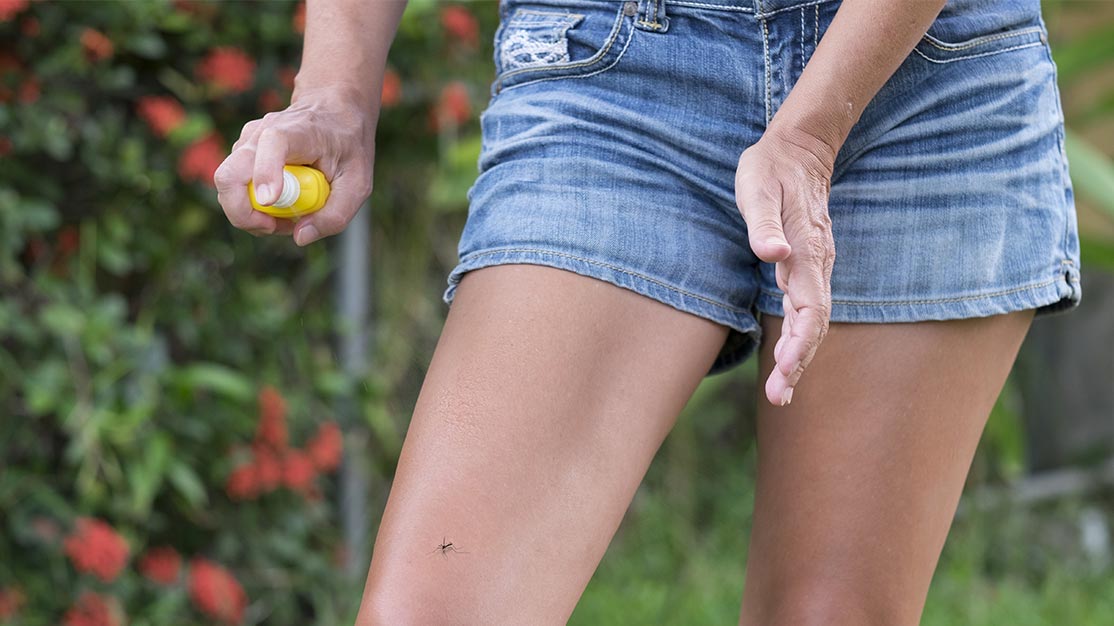Bug Bites: Symptoms and Treatment

From mosquitoes to flies to fire ants, some of the biggest pests come in small sizes.
In many cases, bites from these types of insects are harmless, and only cause temporary discomfort. Still, if you've ever had an itchy bug bite or a bug bite with swelling, you know just how bothersome bug bites can be. Learn how to identify and get relief from bug bites.
Identifying bug bites
It can be tricky telling what insect bit you. Here's how to pinpoint other bug bites vs. mosquito bites:
- Mosquitos: Mosquitoes usually lurk in humid, shaded areas near standing water, such as pools and lakes. Bites result in a stinging sensation followed by a red, itchy mound with a tiny puncture mark at the center.
- Flies: Flies are often found around garbage, food or animal waste. Their bites appear as painful, itchy bumps that may turn into small blisters.
- Fire ants: Fire ants are found on lawns, parks and pastures. They are usually found in southern states in the U.S. Their bite causes an immediate painful, burning sensation, followed by swelling. Cloudy fluid may develop inside the bite.
- Fleas: Fleas only tend to be a problem if you have a pet living in your home. They cause a group of small bites clustered together, typically on areas of your body where clothing fits tightly.
- Bed bugs: Bed bugs hide in beds, chairs, couches, between cushions and in the folds of curtains. They're more likely to bite at night, and are more active in warm weather. They cause two or three itchy, red bumps in a row that may be topped with a blister.
Bug bite symptoms
Specific symptoms vary based on the type of insect that bit you. Bug bite symptoms can include:
- A small, raised or red bump(s)
- Pain
- Itching
- Swelling
- Blistering
Some people develop an allergic reaction to bug bites. However, allergies to stinging insects, like bees and wasps, are more common. If you have rashes from bug bites or any of these signs of an allergic reaction, seek medical help right away:
- Trouble breathing
- Hives (red bumps) on areas of your skin where you weren't bitten
- Red, swollen bite that worsens
- Headache or dizziness
- Nausea or vomiting
- Chest pain
- Increased heart rate
- Swelling of your lips, tongue or face
Why do bug bites itch?
Some bugs inject venom into your skin when they bite you, causing an itching sensation. Mosquitoes leave their saliva behind when they bite, which also causes itchiness. Try not to scratch bug bites because itching can lead to infection.
How long do bug bites last?
Bothersome symptoms from bug bites tend to only last a day or two.
Bug bite treatments
Here's how to stop bug bites from itching and feeling painful:
- Gently clean bites with soap and water, taking special care not to break blisters.
- Apply a cool compress or ice pack to the affected area. This can help reduce swelling and pain.
- Apply an over-the-counter (OTC) anti-itching cream, such as calamine lotion or hydrocortisone, to the bite several times a day until symptoms go away. Or take an OTC oral antihistamine. Baking soda paste can be used as an alternative if you prefer home remedies for bug bites. Mix baking soda with water until you get a paste consistency and apply it directly to the bug bite.
Before you try other natural remedies such as essential oil for bug bites, talk to your health care provider. It isn't known if certain oils will aggravate some bug bites.
See your health care provider if your bite looks like it's getting worse or you cannot get itch relief. You should also contact your provider if you have signs of infectious bug bites, including redness, warmth, swelling or drainage at the site of the bite or a fever, so you can get treatment. In some cases, cellulitis, a bacterial infection that affects the skin and tissue underneath, can develop after a bug bite.
Bug bite prevention
Bites from mosquitoes, ticks and fleas can carry certain viruses or parasites that can make you sick. For example, there have been cases of West Nile virus and Zika virus in the U.S. from mosquitoes, and in other parts of the world, mosquitoes can carry malaria and yellow fever. Ticks are known to spread Lyme disease and Rocky Mountain spotted fever. You can help protect yourself from mosquito, tick and flea bites and any harmful germs that they may carry by taking these actions:
- Stay out of tall grass and bushes.
- Use an Environmental Protection Agency-registered insect repellent.
- Wear light-colored, protective clothing that covers your arms and legs.
- Tuck pants into socks when you go hiking.
While many bug bites are nothing more than minor nuisances, see your health care provider if your bite gets worse or if you have signs of an allergic reaction or infected bug bite. Your provider can offer treatment recommendations so you can get relief.
Clinically reviewed and updated June 2021.